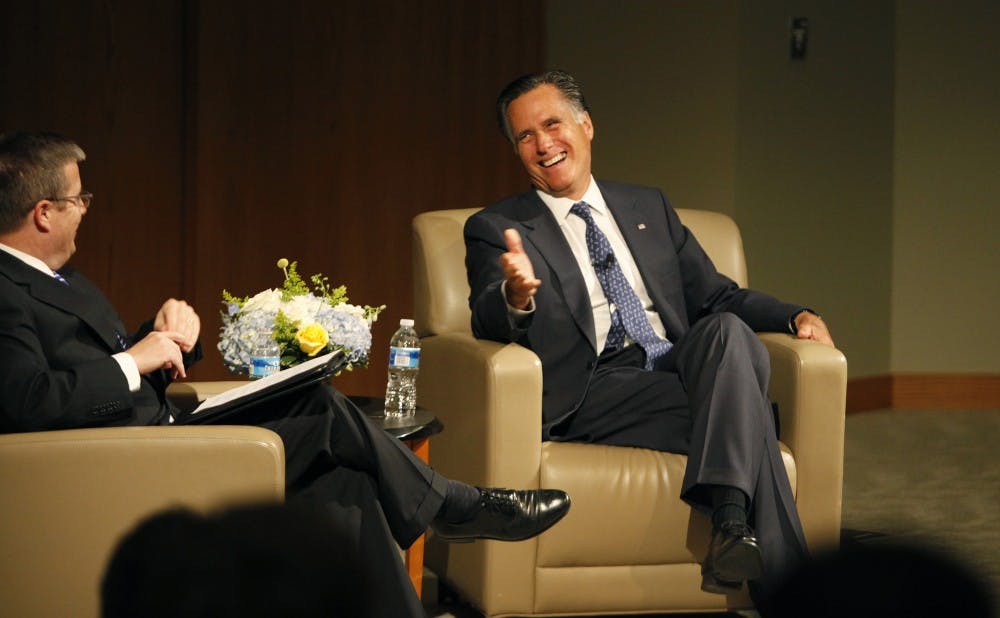Having correctly picked the Blue Devils to take the title and finishing in the top 0.1 percent of NCAA tournament brackets, Mitt Romney's timing could not have been better.
Romney, the 2012 Republican presidential candidate and former Massachusetts governor, spoke to a full crowd at the Fuqua School of Business Tuesday night. The discussion—A Conversation with Governor Mitt Romney—was hosted by Peter Feaver, professor of political science and public policy and director of Duke’s American Grand Strategy Program, and focused on the upcoming 2016 election cycle and foreign policy.
“I think that the President’s foreign policy has been disastrous for America and for the world,” Romney said.
President Barack Obama's decisions have affected even those outside the United States' borders, Romney argued. He added that Obama is incorrectly of the opinion that Russia is not America's geopolitical adversary as evidence of his shortcomings in that area.
The discussion was received by an audience comprising all facets of the Duke community—including both undergraduate students and faculty. The tickets sold out, with several people occupying standing-room only areas to hear Romney's thoughts.
“It’s often felt as though members of the Republican Party don’t have as good of a reception on campus, so I thought it was refreshing to see Mitt Romney here,” said Pi Praveen, junior and chair of the American Enterprise Institute Student Council.
During his discussion, Romney talked about some of his shortcomings in the 2012 presidential race, but particularly focused on what the Republican Party should do to prevail in the 2016 election.
“I don’t spend a lot of time going back and trying to rehearse what I would have done different piece by piece. Instead, I look forward to 2016,” he said.
The Republican Party's greatest challenge is to appeal to minority communities, Romney said. He noted that one reason Republican candidates have had trouble connecting with minority voters is that they do not vote heavily in Republican primaries, so candidates do not tend to focus on those groups until late in their campaigns.
“When we have a nominee, he or she only has a few months to run off and let the minority community know that we are interested in your vote too, and then [the voters] say, 'well where have you been the past two years?'” Romney said.
In order to gain a greater and more diverse following, the Republican Party needs to make is clear they do not only represent the wealthy, Romney said. He noted that the Democratic Party routinely portrays itself as the party for the poor and middle classes while casting Republicans as for the rich.
“Nothing could be farther from the truth in my opinion,” he said. “The rich, by the way, will do fine under any leadership—Republican or Democrat."
In addition to discussing the 2016 campaign, Romney discussed Obama’s foreign policies, including his platform in the 2012 election and current stance.
“I happen to think that the overall foreign policy posture that the President represented in 2012 and continues to represent is at odds with the interests of America today,” Romney said.
Romney gave his thoughts on growing global security threats—focusing on his disagreement with the preliminary deal involving Iran's nuclear power reached last week. Some think that as a result of the final deal, U.S. and international sanctions on Iran will be removed with the expectation that the country will comply with restrictions on its nuclear program.
“Our greatest threat, as I said [during the 2012 campaign], is a nuclear Iran,” he said.
Romney cited long-standing tensions between the the U.S. and Iran as his rationale for being skeptical of the deal.
“They chant death to America everyday,” Romney said.
Even though the preliminary deal was widely celebrated by news outlets, Romney remains doubtful that the Obama administration got the better end of it.
“There is no question in my mind that any deal with Iran will be celebrated by the mainstream media,” he said. “Iran will look like they are good guys now, and everything will be rosy for a while. I just happen to think this deal is not the deal that it could’ve been.”
The threat of the Islamic State group will be the most critical foreign policy issue in the next presidential election, Romney predicted.
As for who he sees taking on that challenge, Romney said he believes there are approximately 15 great candidates for the Republican Party in the 2016 election.
At the conclusion of the discussion, some in the audience left with a new perspective on the man who lost the 2012 election.
“I’m not going to lie, I wasn’t the biggest fan of Governor Romney, especially when he was running for presidency," freshman Aateeb Khan said. "But coming here—it was just good to listen to someone with as much influence in the political culture as he’s had.”
The talk was part of the Ambassador Dave and Kay Phillips Family International Lecture Series and was co-sponsored by Duke’s American Grand Strategy Program, the Office of Global Strategy and Programs, the Sanford School of Public Policy and the Triangle Institute for Security Studies. Past speakers through the program include CNN host Fareed Zakaria, former Secretary of State Condoleezza Rice and retired four-star Army Gen. David Petraeus.
This article was updated Thursday afternoon to include Pi Praveen's full title.
Get The Chronicle straight to your inbox
Signup for our weekly newsletter. Cancel at any time.

